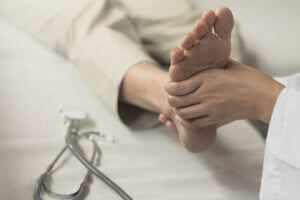
Foot problems are among the potentially serious complications of poorly controlled diabetes. They are caused by nerve damage and poor blood circulation. They can result in chronic pain, numbness, and weakness in the foot, and ulcers or sores.
Common diabetic conditions that cause foot problems include peripheral vascular disease (PVD), which is a progressive circulation disorder that causes narrowing of blood vessels; diabetic neuropathy, which causes nerve damage; and foot deformities, which occur when the ligaments and muscles that stabilize the foot bones deteriorate.
Whether you have recently been diagnosed with diabetes or are living with it for years, it proves prudent to regularly see a podiatrist, if you are experiencing foot pain or even before you do. A podiatrist is a physician who specializes in the diagnosis and treatment of the full range of conditions that affect the foot and ankle. Your podiatrist will perform a thorough evaluation, which includes a physical examination of your feet and assessment of your symptoms, medical history, and current health conditions, and then devise a suitable treatment plan.
Nonsurgical Treatment for Diabetic Foot Problems
Treatment will depend on the cause and severity of your foot problem. The goal of the treatment is to mitigate the pain, restore function, and prevent complications.
If your podiatrist confirms that your foot pain is caused by diabetic neuropathy or peripheral vascular disease, they will craft a treatment plan aimed at slowing its progression. This is done by closely monitoring your blood sugar levels and keeping them within their normal range.
Your podiatrist will typically recommend any or a combination of the following treatment methods:
- Lifestyle changes (such as regular exercise, dietary changes, quitting smoking)- to control risk factors
- Corrective orthotics- to improve foot function and minimize stress forces that cause foot pain or that could lead to deformity
- Splinting, casting, or bracing to correct bone deformities
- Pain medications (such as opioids, pregabalin, and gabapentin)- to alleviate nerve pain
- Antibiotics- to treat infection.
- Physical therapy- to improve your ability to move, carry out your day-to-day activities, and improve circulation in your limbs, and reduce pain
- Wound care (such as cleaning and dressing wounds)- to prevent the wound from festering and facilitate healing.
Surgical Treatment for Diabetic Foot Problems
For cases of diabetic foot problems that are unresponsive to nonsurgical treatments or in which there is a significant amount of infected or dead tissue, surgery is the only recourse.
The type of surgery your podiatrist will recommend will depend on your specific foot problem. Below are a few types of surgeries commonly done on patients with severe cases of diabetic foot problems.
- Exostectomy- This is a procedure used for addressing Charcot foot. This involves shaving or removing the bony prominences.
- Peripheral artery bypass- This type of surgery is done to reroute blood supply around a blocked artery
- Debridement- This procedure is done on patients who have developed gangrene (due to reduced blood supply in the body tissues that has led to necrosis). Debridement is done to eliminate the infected tissue and prevent the infection from spreading.
Preventing Diabetic Foot Problems
Risk reduction or prevention of diabetic foot conditions starts with proper diabetes management. The following self-care measures help you prevent diabetic foot problems or slow the progression thereof if you already have one.
- Monitoring blood glucose levels
- Eating a balanced diet
- Getting regular exercise
- Giving up smoking
- Controlling your blood pressure
- Maintaining a healthy weight
Diabetic Foot Pain Treatment in West Orange, NJ
At Hudson MD Group, our multispecialty team of providers includes highly qualified podiatrists who are committed to delivering exceptional quality of care using a wide range of effective treatment methods, both nonsurgical and surgical.
To schedule an appointment with one of our podiatrists, call us at (973) 705-4914 or you can contact us at the location nearest to you. You can also send us a message.


